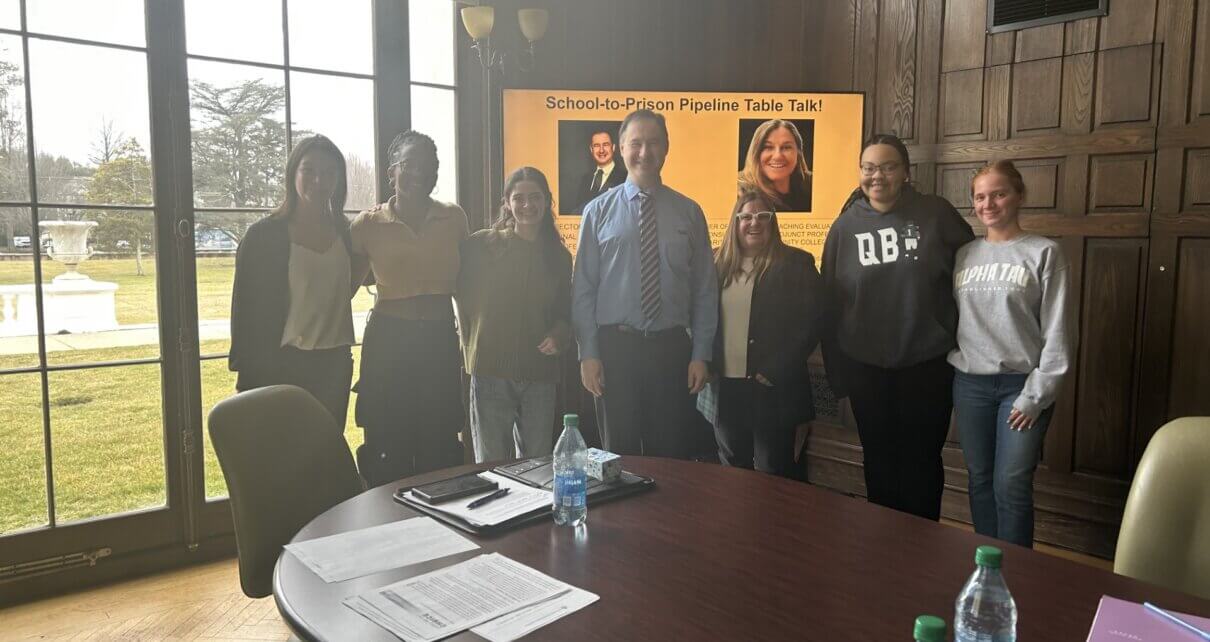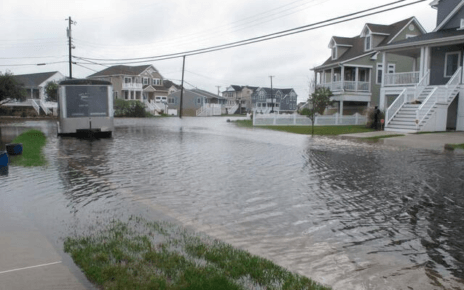On Feb. 12, 2024, the Social Justice Club held a table talk on the School-to-Prison Pipeline Theory. This theory refers to policies and practices that directly and indirectly push students out of school and on the path to prison. This discussion included Paul Hirschfield, Ph.D., Rutgers University’s Director of Criminal Justice and Associate Professor of Sociology, and Professor Dawn who is an adjunct professor at Raritan Valley Community College and Middlesex College and has more than 25 years of experience as a police officer. She is also the owner of Innovative and Teaching Evaluation and Consulting, LLC.
The two touched on how implicit biases and cultural misunderstandings contributed to the overrepresentation of school groups and the strategies teachers and administrators employ to navigate and mitigate these biases.
Melissa Alvare, Ph.D., a lecturer in the Department of Political Science and Sociology, sat in on this discussion. She shared her thoughts on Hirshfield’s description of how heightened security leads schools to become settings where students feel they are often under surveillance and looked at as potential criminals. Harsh discipline and criminalization process affects young people, according to Hirschfield, by making them feel like they are detached from school.
Professor Dawn Flanders, who considers herself a “pragademic” touched on her experience as a school resource officer (SRO) in a predominantly Black school. Countering Hirshfield’s points, she stood on the fact that SROs can serve as important agents of protection and push for a climate of respect and friendliness for students. This makes both students and teachers feel safer.
Alvare said, “We need to address processes of criminalization in settings where we should be focused on enabling learning, growth, and restorative justice.” She would recommend students to attend events like this. She feels that the conversation was dynamic and insightful.
She continued, “Dr. Hirschfield and Prof. Dawn shared divergent perspectives, but listened and responded to one another thoughtfully, each acknowledging each other’s valid points and their mutual desire to create supportive, positive learning environments for young people.”
Johanna Foster, Ph.D., Associate Professor of Sociology and the Helen Bennett McMurray Endowed Chair of Social Ethics in the Department of Political Science and Sociology, gave her own opinion regarding the topic of the event. She said, “The school-to-prison pipeline is a deeply disturbing social phenomenon that disproportionately impacts students of color, students without class privilege, and also LGBTQIA students, and students with disabilities.”
Foster continued, “The phenomenon, which some may dismiss as ‘hypothetical’ or ‘theoretical’ is a highly troubling and well-documented set of systemic policies and practices in schools that divert students away from critical educational, mental health, and social service resources, and into the criminal legal system.” She mentioned practices such as expansion, escalation, and overreliance on punishment mechanisms that should be replaced with social and educational support that currently includes the presence of police and patterns of in-school arrests.
Practices and policies also include the transformation of physical and learning environments, according to Foster. This includes a serious shortage of teachers and crushes divestment in public school funding across the nation. She said, “The results of this are reflected in the really chilling data that show persistent racial disparities in detentions suspensions, and arrests in schools, as well as indisputable racial disparities in youth incarceration that we know are paired with the restructuring of many public schools to map on the logics of the criminal legal system.”
Something she gained from this event is how proud she was of Monmouth’s students. She mentioned that they took steps above and beyond the classroom to find answers to questions about issues that are important to them. Foster explained, “The panelists were highly engaging, came with important professional and research experience, and provided us with a window into the problem that we often do not get to see or discuss at length.” She said that she left the event with a better sense of the various perspectives that people in the field hold about this critical problem and why we may be struggling to solve it. She highlighted that she would suggest other students attend similar events. Foster said, “I would absolutely encourage all of my students to attend if they do.”
Taylor Johnson-Bradley, a junior sociology student as well as a member of the Social Justice club, mentioned that she gained a lot of knowledge on the theory from both sides of the spectrum as a former officer and researcher. She said, “I found it was meaningful to learn that there is no evidence that suggests metal detectors in schools are in fact having a positive effect on schools and students as a whole.”
She concluded, “I would definitely recommend students to attend similar events to learn and get insight on important social issues that are affecting everyday people and impacting their lives daily.”




